|


|

Subscribe
Read the Journal Online
Submission Guidelines
Editorial Board
Receive Email Updates
Advertise in Monatshefte
Indexes/Abstracts
Current Issue TOC
Back Issues TOC
Monatshefte 2022 Subscription Rates
Institutions:
print & online $271
online only $233
Individuals:
print & online $103
online only $86
Non U.S. Postage (no postage charges for online-only subscriptions)
Airmail: add $40/yr.
Canadian Subscribers: add 5% GST. |
Monatshefte
Volume 112, Number 4, Winter 2020
Table of Contents
Special Issue: Aras Ören
From the Editors
ARTICLES
Ela Gezen
Einleitung: Aras Ören – Zeitzeuge, Chronist und Archivar (West)Berlins
Helga Neumann
„Archive sind unfreundlich von soviel aufbewahrter Wirklichkeit“. Zum Aras-Ören-Archiv in der Akademie der Künste, Berlin
A brief discussion contextualizes archival material from the Akademie der Künste Berlin’s archive of materials by and about Aras Ören. (HN; in German)
Leslie A. Adelson
When Sincerity Fails: Literatures of Migration and the Emblematic Labor of Personhood
Saskia Sassen’s landmark study Globalization and Its Discontents characterizes migrant laborers as “emblematic subjects” of a global economy. Reprinted from The Turkish Turn in Contemporary German Literature, here with a focus on one of Aras Ören’s earliest contributions to Turkish-German literature, “When Sincerity Fails” analyzes the emblematic labor of literary configurations of migration instead, by focusing on the aesthetic form and surprising cultural stakes of Ören’s impactful novella of 1981, known in German translation as Bitte nix Polizei. While much scholarship on literatures of migration continues to presuppose an authentic migrant self who suffers indignities sincerely, this article offers important alternatives for evaluating the rhetorical conceit and social deixis of literary “personhood” in transnational literatures of migration. The elusive cipher of the illegal migrant laborer in Ören’s novella allows us to contemplate the changing hieroglyphic of ethnicity—and the labor of reading—in increasingly networked times. (LA)
Deniz Göktürk
Intermedial Solidarity: Drawing Inspiration from the 1970s
This essay reframes Aras Ören’s epic poems, most prominently Was will Niyazi in der Naunynstraße [What is Niyazi up to in Naunynstraße] (1973), in the context of a multimedia aesthetic project combining poetry, dramatic acting, and documentary to conceive the city as a dynamic site of migration, contact, and change. The poems are analyzed in conjunction with a related but lesser-known television film that was produced by Sender Freies Berlin (SFB) as a collaboration between Ören and the director Friedrich W. Zimmermann, Frau Kutzer und andere Bewohner der Naunynstraße [Frau Kutzer and Other Residents of Naunynstraße] (1973). Göktürk teases out resonances between this intermedial collaboration and media-theoretical conceptualizations of an actively engaged reader-viewer-subject as discussed by Bertolt Brecht, Walter Benjamin, Siegfried Kracauer, and Hans Magnus Enzensberger, arguing that self-ironic agency of those portrayed is crucial for the potential activation of spectators to imagine solidarity beyond paternalist talking down or melodramatic pitifulness. (DG)
David Gramling
Back by Inscrutable Demand: Ali Itır’s Multilingual Return in Berlin Savignyplatz
This essay builds on previous work on Ören’s figure of Ali Itır from the point of view of multilingualism on the one hand and critiques of neoliberal literature on the other. I argue that Berlin Savignyplatz attempts to disavow and abandon an iconic sign in this character of Itır that has become pernicious for the author’s own narrative consciousness in the years between 1983 and 1993. On the basis of close readings of passages in both the German and Turkish versions of the novel, without preferencing either, I suggest that Ören merits wider consideration as a literary theorist intervening in many of the same domains of conceptualization as 1990s luminaries like Derrida and Ricoeur, and Şenocak in German Studies particularly. I read Ören’s Berlin Savignyplatz novel in its/their Turkish-and German-language versions with a view to the differential relationality between them, as a philosophical fiction or multilingual poetics, epitomized by the figural sign Ali Itır itself. I further argue that it is Ören’s ambivalence toward literary monolingualism in Germany that obstructed his broader uptake as such a theorist. (DG)
Moray McGowan
The Hand that Rocks the Cradle? Aras Ören’s “Europa”
The chapter reviews the prominent and diverse images of “Europa” in Aras Ören’s texts of the 1970s and 1980s. Ören locates the experience of labor and other migration as part of the “blutende Wunde”of European history, the continuum of class and ethnic exploitation (Ören, Berliner Trilogie 218). At the same time, though, the inequalities of labor migration generate economic, demographic and cultural dialectics which eventually transform the colonizing as well as colonized society. “Europa” is, moreover, a place of critical reflection on the complex relationship between Turkish, German, and Turkish-German experiences and histories. The apparent exhaustion of the political project within which Ören’s early work was predominantly seen has undoubtedly contributed to its recent relative neglect, despite the prominent role writing of migration, including Turkish-German writing, has assumed in contemporary German studies. Against this, the chapter seeks to demonstrate the continued importance of his poetic visions of a Europe in transformation. (MM)
Yasemin Yildiz
Aras Ören’s What Does Niyazi Want in Naunyn Street. A Partial Translation with a Translator’s Introduction
Tom Cheesman
What’s Going On: Poems by Aras Ören with a Translator’s Introduction
REVIEW ARTICLE
Jana Schuster
Wetterbericht. Aktuelle Forschung zu Meteorologie, Klima und Atmosphäre (in) der Literatur
(Schlesinger, Claus-Michael, Aufklärung und Bewölkung. Poetik der Meteore im 18. Jahrhundert, 2018. – Grill, Oliver, Die Wetterseiten der Literatur. Poetologische Konstellationen und meteorologische Kontexte im 19. Jahrhundert, 2019. – Ungelenk, Johannes, Literature and Weather. Shakespeare – Goethe – Zola, 2018. – Urs Büttner und Ines Theilen, Hrsg., Phänomene der Atmosphäre. Ein Kompendium Literarischer Meteorologie, 2017. – Georg Braungart und Urs Büttner, Hrsg., Wind und Wetter. Kultur – Wissen – Ästhetik, 2018.)
BOOK REVIEWS
Arjomand, Minou, Staged: Show Trials, Political Theater, and the Aesthetics of Judgment (Michael Shane Boyle)
Doll, Max, Der Umgang mit Geschichte im historischen Roman der Gegenwart. Am Beispiel von Uwe Timms „Halbschatten“, Daniel Kehlmanns „Vermessung der Welt“ und Christian Krachts „Imperium“ (Emily Sieg Barthold)
Düwell, Susanne, Andrea Bartl, Christof Hamann und Oliver Ruf, Hrsg., Handbuch Kriminalliteratur. Theorien – Geschichte – Medien (Julia Karolle-Berg)
Friedrich, Hans-Edwin, Hrsg., Arno Schmidt und das 18. Jahrhundert (Heinrich Clairmont)
Honold, Alexander und Rolf Parr, Hrsg., Grundthemen der Literaturwissenschaft: Lesen (Sabine Gross)
Jansen, Wolfgang, Willi Kollo. Autor und Komponist für Operette, Revue, Kabarett, Film und Fernsehen 1904–1988 (Alan Lareau)
Jung, Werner und Liane Schüller, Hrsg., Orwells Enkel. Überwachungsnarrative (Simone Pfleger)
Layne, Priscilla, White Rebels in Black: German Appropriation of Black Popular Culture (Dirk Göttsche)
Löwe, Matthias und Gregor Streim, Hrsg., ‚Humanismus‘ in der Krise. Debatten und Diskurse zwischen Weimarer Republik und geteiltem Deutschland (Thorsten Carstensen)
Rautenberg, Ursula und Ute Schneider, Hrsg., Lesen. Ein interdisziplinäres Handbuch (Sabine Gross)
Reidy, Julian, Raum und Interieurs in Thomas Manns Erzählwerk. Materielle Kultur zwischen ‚Welthäusern‘ und ‚Urdingen‘ (Esther Bauer)
Stone, Katherine, Women and National Socialism in Postwar German Literature: Gender, Memory, and Subjectivity (Marcel Rotter)
Technau, Björn, Beleidigungswörter. Die Semantik und Pragmatik pejorativer Personenbezeichnungen (Ulla Fix)
Voit, Friedrich, Karl Wolfskehl: A Poet in Exile (Rolf J. Goebel)
Waßmer, Johannes, Die neuen Zeiten im Westen und das ästhetische Niemandsland. Phänomenologie der Beschleunigung und Metaphysik der Geschichte in den Westfront-Romanen des Ersten Weltkriegs (David Pugh)
Wolff, Lynn L., A Modernist in Exile: The International Reception of H.G. Adler (1910–1988) (Traci S. O’Brien)
INDEX VOLUME 112 (2020)
|

